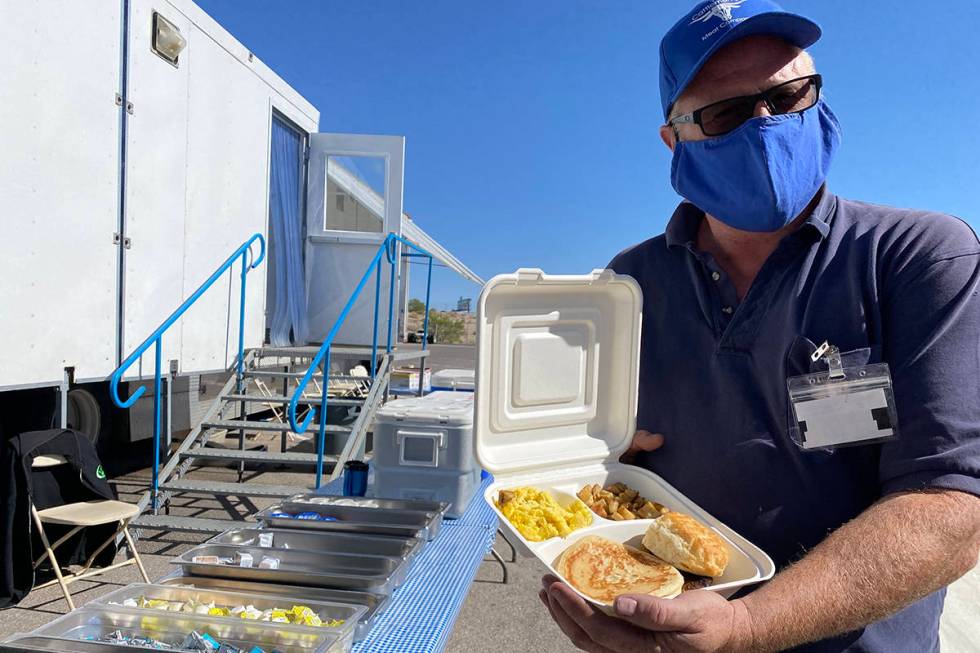Support services ensure hot showers, meals for firefighters

A small, makeshift community formed Tuesday morning in the parking lot of Centennial High School, its members readying to support firefighters battling the Mahogany Fire in the days and weeks ahead.
At one end of the parking lot on Centennial Parkway was Corey Beasley, the kitchen manager of Cattlemen’s Meat Company of Cut Bank, Montana. He and a handful of employees set up a large, contracted catering operation that will serve high-calorie meals to more than 240 firefighters and administrators brought to Southern Nevada to fight the blaze.
“An emergency mobile food unit,” Beasley said. “We also can be dispatched by FEMA under circumstances such as Hurricane Katrina. This kitchen unit was actually in Hurricane Katrina for six months feeding the civil servants. So not only do we do the wildland firefighting, we also do the National Guard training and FEMA incidents.”
On Tuesday morning, Beasley said Cattlemen’s provided breakfasts of scrambled eggs, potatoes, pancakes and biscuits to firefighters. Condiments, cereal, coffee and beverages offered through a “no touch zone” distribution system also were provided. Firefighters used to show up in person to grab the meals, but these days, they are packaged up and delivered to firefighters in the field to help prevent the transmission of COVID-19.
“They get a hot breakfast, a sack lunch and a hot dinner,” Beasley said, adding that the meals are delivered by a ground support crew.
“It is very rewarding, very adventurous, and you get to see unique and unusual places that most people don’t get to go to, let alone drive semis into the backwoods,” Beasley said. “This is kind of a luxury spot because we are on a hard surface, on blacktop. We are normally up in the mountains some place or in the middle of fields, very remote and unusual sites that they put us in.”
‘A good, hot shower’
At another end of the parking lot is Craig Dewsnup of Gridley, California. His company, Dewsnup Fire Support, offers mobile showers with 16 stalls for firefighters and their incident command team.
“A lot of people come in the morning and shower, and they also come at night,” Dewsnup said. “Usually after they get off the line they come in between 7 and 10 or 10:30 (p.m.) or so. They take showers so they can sleep comfortably through the night. In the morning a lot of folks come and shower, too, use the sinks for brushing their teeth, shaving and getting ready in the morning. The firefighters are usually full of carbon from the fire and stuff, and they like to get a good, hot shower.”
The firefighters are offered private shower stalls fed by a 2,000-gallon storage tank and a high-tech, water heating system.
“Hot water is just one nozzle, and it turns cold or hot,” Dewsnup said.
“We’ve been on a lot of fires from Montana to Washington to Utah,” Dewsnup said. “This is the first time we’ve been in Nevada.”
Dewsnup said the incident team is prepared to be at Centennial from eight to 12 days, but that could change, depending on how long it takes to put out the fire.
Keeping firefighters healthy
Brandon Hampton, a fire information officer for Great Basin Team 7, said firefighters appreciate the support services. The services are contracted through the U.S. Forest Service and are a critical component to fighting wildfires across the nation. Firefighters arriving in Southern Nevada are from across the Southwestern United States, he said.
“They live for fighting fires, and this is what they do,” Hampton said. “They make sacrifices from their families to come out here.”
Preventing the transmission of COVID-19 has resulted in most firefighters sleeping in the field and increased the importance of hot showers.
“Especially with COVID, making sure firefighters are practicing sanitary expectations — this is a key component in staying healthy,” Hampton said. “Most firefighters work 16-hour days, so they are up at 6 a.m., work throughout the day into the late evening, only taking a small break for lunch. They come in, get dinner, take a quick shower, and they are back at it the following day.”
He said they typically do that for 14 to 21 days.
“Most of the firefighters, due to COVID precautions, we are keeping those firefighters in the field,” Hampton said. “We want to minimize the impact to the community and minimize the impact of the spread, so we are keeping those firefighters in the field. We are feeding them out there, letting them sleep out there in the forest. It’s not super comfortable, but it allows them to be safe and stay healthy. That’s a huge component of us getting our firefighters home in the same condition they arrived in.”
Contact Glenn Puit at gpuit@reviewjournal.com or 702-383-0390. Follow @GlennatRJ on Twitter.